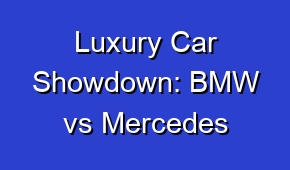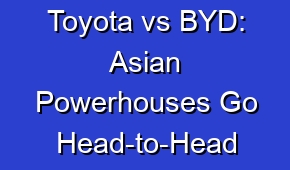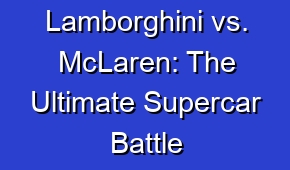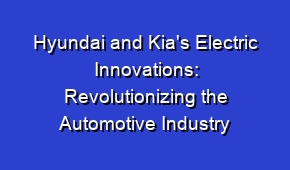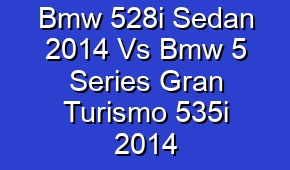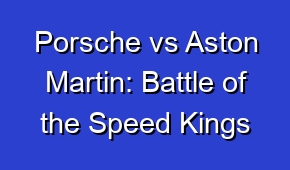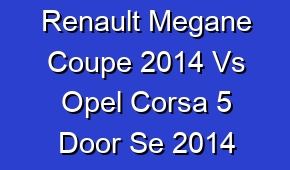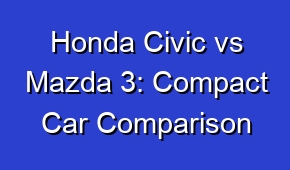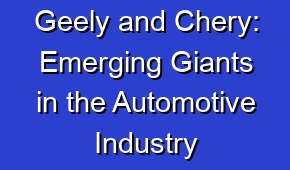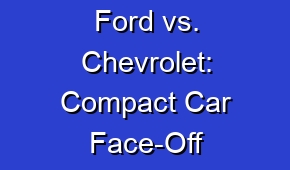Tesla vs. NIO: Electric Dreams Compared
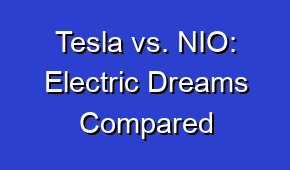
Get ready for an electrifying showdown between Tesla and NIO as these two automotive giants compete to dominate the electric vehicle market. Discover the latest innovations, performance features, and technological advancements driving the electric dreams of both companies. Brace yourself for a thrilling battle that will shape the future of sustainable transportation.
When it comes to the electric vehicle market, the battle between Tesla and Nio is heating up. These two companies are at the forefront of the industry, each with their own unique vision and approach. While Tesla has been dominating the market for years, Nio is quickly gaining ground with its innovative technology and sleek designs. Both companies are driven by the electric dreams of a sustainable future, but they have different strategies to achieve this goal. While Tesla focuses on building a global network of charging stations and pushing the boundaries of autonomous driving, Nio is focused on creating a seamless user experience and offering cutting-edge battery swapping technology. The competition between these two giants is fierce, but it ultimately benefits consumers as they continue to push the boundaries of what is possible in the world of electric vehicles.
| Electric dreams: Tesla vs. NIO |
| Tesla and NIO are two prominent players in the electric vehicle industry. |
| The rivalry between Tesla and NIO has sparked intense competition in the market. |
| Tesla is known for its cutting-edge technology and innovative designs. |
| NIO, on the other hand, focuses on providing a luxurious and premium driving experience. |
- Tesla’s Model S and Model 3 have gained widespread popularity among electric car enthusiasts.
- NIO’s flagship model, the ES8, offers impressive performance and advanced autonomous driving features.
- Both Tesla and NIO are expanding their charging networks to enhance convenience for customers.
- The success of Tesla’s Model 3 has put pressure on NIO to accelerate its production capabilities.
- Investors closely monitor the competition between Tesla and NIO as it impacts the stock market.
What are the differences between Tesla and NIO electric cars?
Tesla and NIO are both prominent players in the electric car industry, but they have some key differences. One major difference is their country of origin. Tesla is an American company, while NIO is a Chinese company. This can influence factors such as design, technology, and target markets.
| Company | Tesla | NIO |
| Founded | 2003 | 2014 |
| Headquarters | Palo Alto, California, USA | Shanghai, China |
| Range | Up to 370 miles | Up to 615 miles |
Another difference is their approach to battery technology. Tesla is known for its advanced battery technology and has its own Gigafactories for battery production. NIO, on the other hand, has adopted a swappable battery system, allowing users to quickly replace their depleted batteries with fully charged ones at dedicated stations.
Which electric car brand offers better performance: Tesla or NIO?
Both Tesla and NIO offer impressive performance in their electric cars, but there are some differences to consider. Tesla is known for its powerful acceleration and high top speeds. Models like the Tesla Model S Plaid have set records for their speed and performance.
- Tesla offers better acceleration and top speed compared to NIO. With their flagship model, the Tesla Model S Plaid, reaching 0-60 mph in just under 2 seconds, it is currently one of the fastest electric cars on the market. NIO’s fastest model, the NIO EP9, takes around 2.7 seconds to reach the same speed.
- When it comes to range, Tesla also has an advantage. Their models generally have a longer driving range compared to NIO’s offerings. For example, the Tesla Model S Long Range can travel up to 412 miles on a single charge, while the NIO ES8 has a range of around 340 miles.
- However, NIO offers some unique features that set it apart from Tesla. One notable feature is its battery swapping technology, which allows users to quickly swap out their empty battery for a fully charged one at dedicated stations. This can be a convenient option for those who don’t want to wait for their car to charge.
NIO, on the other hand, focuses on providing a balanced driving experience with a combination of power and comfort. Their electric cars often feature advanced suspension systems and offer a smooth ride. The NIO EP9 supercar has also made headlines for its impressive performance on the track.
What is the price range of Tesla and NIO electric cars?
Tesla and NIO offer electric cars at different price points to cater to various customer segments. Tesla has a range of models with different prices, starting from the more affordable Model 3 to the luxurious Model S and Model X. The recently introduced Model Y also falls within a competitive price range.
- The price range of Tesla electric cars starts from $39,990 for the Model 3 Standard Range Plus and goes up to $139,990 for the Model S Plaid.
- The price range of NIO electric cars starts from ¥358,000 (approximately $55,000) for the ES6 Standard Range and goes up to ¥526,000 (approximately $81,000) for the ES8 Performance Edition.
- Tesla offers a variety of models in different price ranges, including the Model 3, Model Y, Model S, and Model X.
- NIO offers three main models, namely the ES6, ES8, and EC6, each with different price ranges and specifications.
- Both Tesla and NIO electric cars are known for their advanced technology, performance, and range, catering to different customer preferences and budgets.
NIO, on the other hand, positions itself as a premium electric car brand. Their models, such as the ES6 and ES8, are designed to offer high-end features and luxury experiences. As a result, NIO electric cars tend to have higher price tags compared to some Tesla models.
Which electric car brand has a better charging infrastructure: Tesla or NIO?
When it comes to charging infrastructure, Tesla has a significant advantage over NIO. Tesla has developed its Supercharger network, which consists of thousands of charging stations worldwide. These Superchargers provide fast charging speeds and are strategically located along popular travel routes.
| Charging Infrastructure | Tesla | NIO |
| Supercharger Network | Tesla has a well-established Supercharger network with thousands of charging stations globally. | NIO has its own charging network called NIO Power, but it is not as extensive as Tesla’s Supercharger network. |
| Charging Speed | Tesla Superchargers offer high charging speeds, allowing for quick charging times. | NIO chargers have decent charging speeds, but they are generally slower compared to Tesla Superchargers. |
| Availability | Tesla Superchargers are more widely available, making it easier to find a charging station. | NIO chargers are primarily located in China, limiting their availability for international travel. |
NIO, on the other hand, has its own charging network called NIO Power. While it is expanding rapidly in China, it may not be as extensive or widely available as Tesla’s Supercharger network on a global scale.
What are the safety features offered by Tesla and NIO electric cars?
Tesla and NIO prioritize safety in their electric cars and offer a range of advanced safety features. Tesla vehicles come equipped with Autopilot, which includes features such as adaptive cruise control, lane-keeping assist, and automatic emergency braking.
Tesla and NIO electric cars offer advanced safety features such as collision avoidance systems, autopilot capabilities, and intelligent emergency braking.
NIO also offers various advanced driver assistance systems (ADAS) in their electric cars. These include features like intelligent cruise control, traffic jam assist, and automatic parking. NIO has also introduced NOMI, an AI-powered digital assistant that can provide information and entertainment while driving.
What is the warranty coverage for Tesla and NIO electric cars?
When purchasing an electric car from Tesla or NIO, warranty coverage is an important consideration. Tesla offers a comprehensive warranty package for its vehicles, typically covering the vehicle for 4 years or 50,000 miles, whichever comes first. The battery and drive unit may have separate warranties with longer coverage.
Tesla offers a 4-year/50,000-mile limited warranty and NIO provides a 3-year/60,000-kilometer warranty for their electric cars.
NIO also provides warranty coverage for its electric cars, which usually includes a 4-year or 60,000-mile basic warranty. The battery pack is often covered by a separate warranty with longer terms, offering additional peace of mind to owners.
What are the available models in the Tesla and NIO electric car lineup?
Tesla and NIO offer a range of models to cater to different customer preferences. Tesla’s lineup includes the Model 3, Model Y, Model S, and Model X. The Model 3 is a more affordable option, while the Model S and Model X offer luxury features and higher performance capabilities. The Model Y is a compact SUV that combines versatility with electric power.
Tesla
– Model S
– Model 3
– Model X
– Model Y
NIO
– ES8
– ES6
– EC6
Comparison
– Tesla offers more models in their electric car lineup compared to NIO.
– NIO focuses on luxury electric SUVs, while Tesla has a more diverse range of vehicles including sedans and SUVs.
– Both Tesla and NIO are known for their advanced technology and long-range capabilities in their electric cars.
NIO’s lineup consists of models like the ES6, ES8, EC6, and ET7. The ES6 and ES8 are SUVs with spacious interiors and advanced technologies. The EC6 is a coupe SUV with a sportier design, while the ET7 is a luxury sedan that offers cutting-edge features and autonomous driving capabilities.



